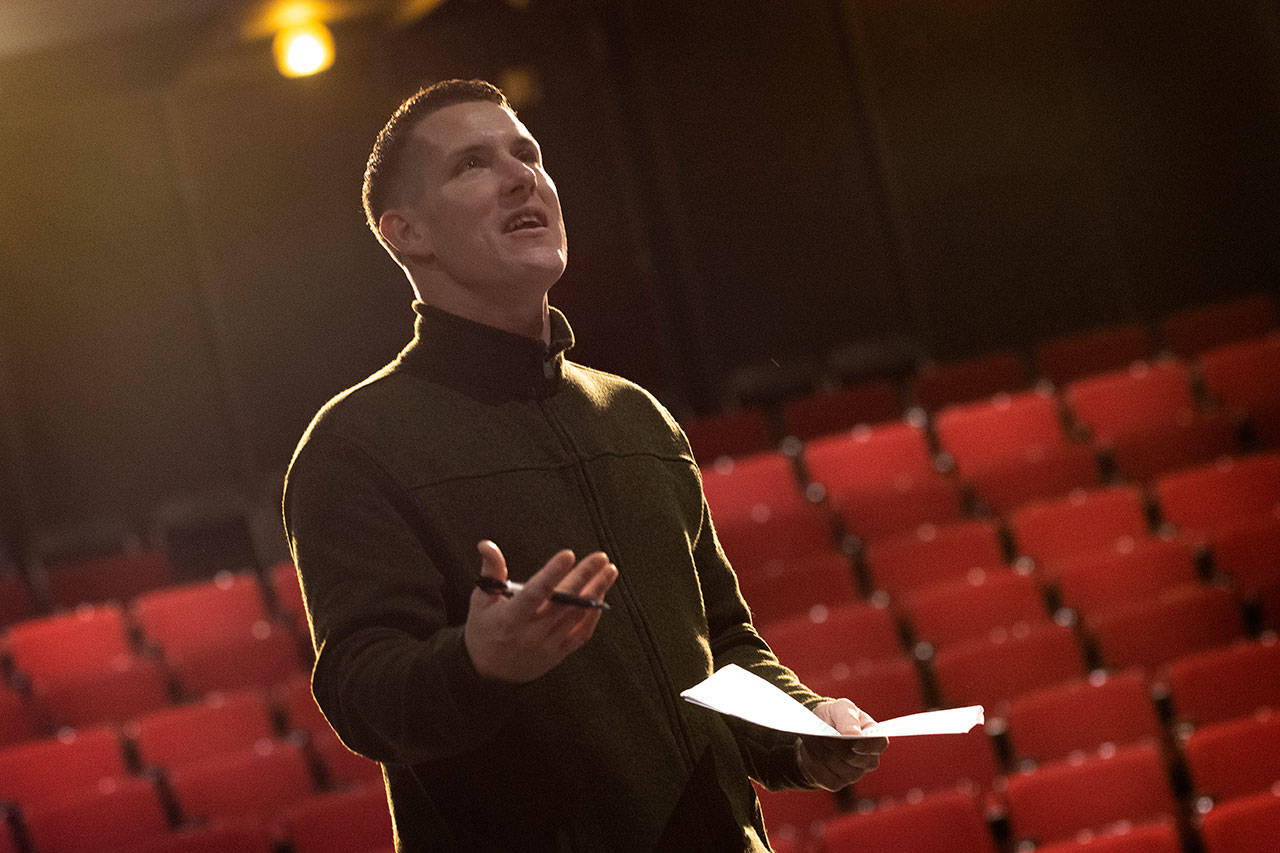PORT ANGELES — Peninsula College drama students are preparing a student-written production that highlights the opioid epidemic on the Olympic Peninsula in an effort to spread a message of hope for those struggling with addiction.
As students rehearsed “OPioids” on Wednesday, which is modeled after a 12-step meeting, recovering heroin addict Leif Ellis was there to provide tips to make the play as realistic possible.
Ellis, a Peninsula College student who plans to go through the college’s nursing program, was one of several people students interviewed as they wrote the play, but Wednesday was the first chance he had to see what the students came up with.
“It’s important to shed light on addiction and on the stigma that comes with it,” said Ellis, who has been off heroin for more than four years. “I just want to show that even people who have been at their absolute worst and deemed not worthy by society are still redeemable and able to create a life for themselves and be a positive member of the community.”
The play is free and opens Friday, March 8 at 7 p.m. at Peninsula College’s Little Theater, 1502 E. Lauridsen Blvd. It also will be performed at 7 p.m. March 9, 15 and 16 and at noon March 13.
Those who attend the performance can expect to have an immersive experience in which they will attend a meeting of the fictional Olympic Recovery Group and experience what a 12-step meeting is actually like.
“We want a really immersive experience,” said instructor Pete Griffen. “The play starts for the actors as soon as they get out of their cars in the parking lot.
“They’ll mix with the audience and audience members won’t know who the cast is at the start of the play.”
Ellis became involved with the project after he was approached by drama and speech instructor Kelly Doran, who shared with him her vision of having students tackle a tough issue affecting many on the Olympic Peninsula. He had shared his experience of addiction when he took her public speaking class last quarter and said he was excited when she approached him.
Doran said she has known for about a year that she wanted opioid addiction to be the focus of this class. She said several of her family members have suffered from opioid addiction and that often when she does devise theater the productions examine social issues.
“I have had family members affected deeply by the opioid crisis and wanted to shine a light on how this problem affects families and communities, and what solutions may be out there that we haven’t yet discovered,” she said.
Though the characters in the play are fictional, they are based on real people. Each of the students interviewed someone affected by the opioid crisis and several recovering addicts visited the class to share their experiences.
Some students modeled their characters after one person’s story while others used information from multiple people.
Nico Borgeman, a first-year Peninsula College student who will chair the Olympic Recovery Group meeting, said he had no idea what he was getting into when the class started.
“I was terrified to do this,” he said.
Borgeman said he found a family member who was willing to be interviewed, but it was a tough subject.
“It felt invasive to ask,” he said. “It’s his past life. It’s bringing up old memories I didn’t think he wanted to surface.”
Ellis told the group that every story they would hear would be different. For him, his recovery involves using Suboxone, a drug that is commonly used to treat people with Opioid Use Disorder.
Suboxone is a drug that combines buprenorphine — a partial agonist that fills cravings for opioids without providing the same high — with naloxone, which blocks opioids and decreases risk of abuse.
“Unfortunately the downside is that people look negatively on Suboxone,” he said. “Most people are going to have their own view about it. Some are positive and some are negative.
“I’m a living breathing example of a Suboxone story gone right.”
Sophomore Bri Gillett interviewed her father and the addiction he faced with painkillers. She said he was diagnosed with meningitis in his late 20s, which led to doctors prescribing various painkillers throughout the years.
“I wanted to show people his story … because I want people to know it can happen to anybody,” she said.
She said he never used heroin but heavily used painkillers. He’s now 10 years without opioids, she said.
Gillett said the group interviews in class and with her father taught her to have more compassion and empathy for people struggling with addiction.
“I had a lot of anger toward addiction,” she said. “I just saw it as more of a choice than a disease, while now I see it as both.”
________
Reporter Jesse Major can be reached at 360-452-2345, ext. 56250, or at jmajor@peninsuladailynews.com.

